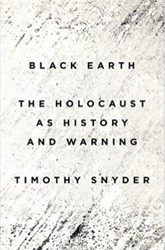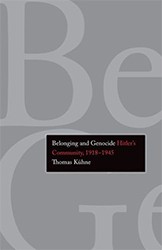Written for a general audience, How Could This Happen is the first comprehensive analysis of the causes of the Holocaust. Dan McMillan, a trained historian and attorney, focuses in vivid and engaging prose on two critical questions: “Why Germany ?” and “Why the Jewish People?”
Drawing on the latest historical research and memoir literature, McMillan — like Yehuda Bauer and Jeffrey Herf, among other leading historians of the Holocaust — largely defines World War II as Hitler’s war against the Jewish people. More specifically, it was the “Jewish Communist conspiracy” that drove Hitler to destroy the Jews in what would become a “merciless struggle for survival between the races.”
Like earlier nineteenth century German racists (e.g., Heinrich Class), Hitler argued that while the Jews took on some human forms, they were less than human, a sub-race more akin to bacteria and vermin. According to McMillan, to protect Germany from the Jewish baccilus, the situation required drastic action by the National Socialist regime. By 1942 the plan was all too clear: to murder every Jew on the European continent.
To carry out this murderous campaign, Hitler was able to draw upon the support of millions of Germans and other European racial nationalists. Hitler recruited a large percentage of German landowners, industrialists, veterans, university students, and landowning farmers, not to mention the majority of German lawyers and doctors to his cause. By January 1933, only the moderate Social Democrats (SPD) and the smaller Communist Party (KPD) continued to resist Germany’s growing adherence to National Socialist values and goals.
Hitler’s application of social Darwinian theory was only one cause that led Germany to commit mass genocide. Germany’s defeat in World War I, which Hitler believed was caused by the Jews, ended the 1914 Burgfrieden (civil peace), shattering in the process the German dream for a Volksgemeinschaft (national community). Germany’s Social Democratic party, which polled thirty-five percent of the vote in the Reichstag elections of 1912, was perceived by Hitler and Germany’s elites with horror. The prominent role played by Jews in both pre-war and post-war left wing German politics only reinforced the growth of anti-Semitism, as millions of Germans began to believe in a “Jewish Bolshevik ” conspiracy that sought nothing less than the destruction of the existing social order.
If racial nationalism, coupled with Germany’s defeat in World War I, helps explain why Germany undertook the Holocaust, the special position held by German Jews answers McMillan’s second major question:“Why the Jewish people?” The author presents four major arguments: first, the Jews were a minority, not just in one way but in two– ethnic and religious. Second, “not only were the Jews a religious minority [in] an overwhelmingly Christian [country] but their faith was both the parent and rival of the Christian tradition.” Third, Germany’s Jews were extraordinarily successful in many occupations. In 1933, for example, German Jews made up less than one percent of the general population. They comprised, however, sixteen percent of all German lawyers and eleven percent of Germany ‘s doctors. Fourth, the Jews were held responsible for the rise of socialism and Communism.
McMillan concludes his work by arguing that “the Holocaust did not [just] happen because the German people…demanded it, but rather because a widely popular dictator and his fanatical followers planned it, because the country’s elite shared enough of Nazi anti- Semitism to participate in the killing and because the rest of the country looked the other way.”
Related content:
Carl J. Rheins was the executive director emeritus of the YIVO Institute for Jewish Research. He received his Ph.D. in Modern European History from the State University of New York at Stony Brook and taught courses on the Holocaust at several major universities.




